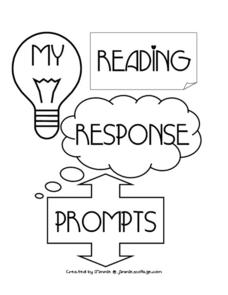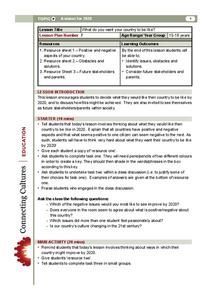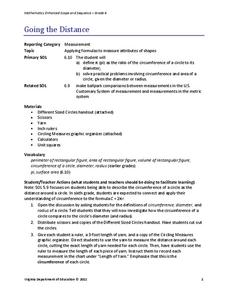Model Me Kids
Model Me Going Places 2
Social stories are wonderful teaching tools specifically designed for learners with Asperger's, autism, PDD-NOS, non-verbal learning disabilities, or other developmental disabilities. They are used to model appropriate social behaviors...
PBS
Racial Equality: How Far Have We Come and How Far Do We Have To Go?
Is everyone treated fairly in America? The culminating fifth lesson from a series of five has pupils explore racial inequalities from the 1960s and decide whether or not society has changed over time. The lesson comes with a speech from...
University of North Carolina
Summary: Using it Wisely
Sometimes summarizing keeps a writer from going deeper into their analysis—don't fall into that trap. Learn the difference between summarizing and analyzing using an insightful resource. Focusing on introductions, the lesson shares...
US National Archives
WWII: Mediterranean and N. Africa 1939-45 – Where Will the Allies Invade?
An interactive asks learners to act as German intelligence agents and examine documents found on the body of an English soldier wash ashore on the cost of Spain. Using the documents, the agents are asked to predict where the Allies were...
Curated OER
Introduce Vocabulary: From Tadpole to Frog (Pfeffer)
Take an amphibious journey with budding readers as you explore vocabulary in Wendy Pfeffer's informative book From Tadpole to Frog. This text is the backdrop of a vocabulary exercise based on six words: fertilize, gills, hatch,...
Curated OER
Introduce Vocabulary: Kindergarten Count to 100 (Rogers)
Combine counting and vocabulary in context using Jacqueline Rogers' Kindergarten Count to 100. Suggested words for this text are: first, fountain, salute, second, and third. By introducing the terms before reading the text, you're...
Poetry4kids
How to Start a Poetry Journal
Practice makes proficient! Using a journal of their choice, authors organize pages, then begin their writing journey of on-going writing practice in which they compose all poetic forms including diamante, limerick, free verse, and more!
Curated OER
Reading Response Prompts
Get your learners going with frames and starters designed for responding to a text. The starters come in speech bubbles, arrows, and other fun shapes that you can cut out and use in a variety of different ways. Also included are pages...
K20 LEARN
Use Your Noodle: Avoiding Comma Blunders
Young grammarians will go to town with a lesson that doodles with macaroni! Scholars cook up sentences with the addition of commas, which makes all the difference in their meaning.
Stew Leonard's
Stewie the Duck Learns to Swim
Make a splash with an interactive storybook that emphasizes water safety. Directed at preschoolers and primaries, the ducky tale and games reinforce the rules of wearing a life vest whenever near water, making sure to have a supervising...
Curated OER
Using Simultaneous Prompting to Teach Opening a Locker
Make opening a locker with a key an easy task for your special needs upper grader. Here you'll find a prompting hierarchy and 15 steps to guide your learner through the process. You'll verbally prompt while physically modeling the locker...
Curated OER
American Culture: Will/Going To
In this American Culture worksheet, students choose the correct form of either "will" or "going to" in order to answer questions commonly used in American culture.
Oxford University Press
Language Focus: Present Continuous, Imperatives
What will your class do in the future? What won't they do? Practice the present continuous form for future arrangements (or future progressive tense) with several fill-in-the-blanks and sentence reordering activities.
Curated OER
Board Game: Race to 100
Who can get to 100 first?! It may be in the hands of chance, but either way kids will have to practice counting and adding along the way. Partners take turns rolling two dice and moving their game pieces that many spaces until one pupils...
Scholastic
Why Did the Shoe Go to the Doctor?
Your learners will use all the hours in a day to complete this riddle! They must figure out how many hours are in one day, three days, six days, and so on by using multiplication. They then use their answers to puzzle out the riddle.
University of the Desert
What Do You Want Your Country to be Like?
How would you like your country to be by 2020? What issues do you feel are most important, and how do those compare with your peers? Learners tackle questions regarding the evolving national and global culture of the twenty-first century...
National Park Service
Should America Have Gone to War in 1812?
Using an incredibly engaging activity and detailed lesson plan, your learners will serve as advisors to President Madison on whether to participate in what would become the War of 1812! Utilize a variety of effective instructional...
Buck Institute for Education
Project Template for Letter to Parents
What better way to elicit the support of parents and guardians in project-based learning than with a letter directed to them that details the project, the activities involved, and suggestions for how they can support their learner. The...
Curated OER
Right to Remain Silent(?)
Learners consider the rights of journalists regarding source confidentiality, then create presentations on the New York Times' use of sources. They write guidelines to aid journalists in evaluating the trustworthiness of their sources.
K-State Research and Extensions
Water
How are maps like fish? They both have scales. The chapter includes six different activities at three different levels. Scholars complete activities using natural resources, learn how to read a map, see how to make a compass rosette,...
Harper Collins
If You Take a Mouse to School
If you give your teacher a book, she'll probably want an activity guide to go with it. Have fun learning with a wonderful selection of hands on activities created for the book, If You Take a Mouse to School. Each activity focuses on...
Curated OER
Going to the Doctor: Social Story
A trip to the doctor can be a difficult experience for some pupils. Intended for use with Autistic children, this social story prepares them for a visit to the doctor. Each page contains an image and a different facet of what happens at...
Houghton Mifflin Harcourt
Wheels Go Around: English Language Development Lessons (Theme 7)
Wheels go around is the theme of the plethora of activities to aid in the language fluency of your scholars in this unit of ESL lessons. Learners can take part in a grand conversation focused on wheels, make their own steering wheel,...
Virginia Department of Education
Going the Distance
Estimate the value of one of the most famous irrational numbers. The hands-on lesson instructs classmates to measure the circumference and diameters of circles using yarn. The ratio of these quantities defines pi.

























